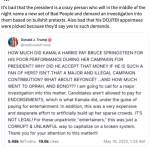
A Word About Joe Biden
May 19, 2025
Alison Bechdel’s Search for Solace
May 19, 2025More than 70 million Americans receive regular retirement and disability benefits through the Social Security Administration, an essential lifeline for retirees.
The agency has been plagued by funding issues for years and now faces new threats from Elon Musk and President Donald Trump. The Trump administration has eliminated three thousand employees at the agency and could soon deliver additional cuts. At the same time, the agency is contending with Department of Government Efficiency (DOGE) investigations into purportedly widespread Social Security fraud, which have so far turned up very little evidence of wrongdoing.
Wall Street has long wanted to privatize Social Security so it can profit from Americans’ retirement savings. Some Democratic lawmakers have warned that Bisignano’s appointment to run the agency represents a significant step toward privatization. His company, which owns a suite of financial technologies, could benefit if the agency chooses to outsource its back-end technology or other services to the firm.
Bisignano will now get a tax break too.
Other affluent Trump administration appointees, who comprise perhaps the wealthiest presidential cabinet in history, stand to benefit from the same tax loophole, which was inserted in the tax code in the 1990s to allow government officials to avoid a tax burden when they divest business interests that pose a conflict of interest. That includes billionaire banker Howard Lutnick, the incoming secretary of commerce, who has been approved to divest hundreds of millions of dollars worth of shares in more than a dozen assets, as Bloomberg reported last month.
In the new documents, which were issued on Wednesday by the Office of Government Ethics, the independent federal ethics agency, Bisignano was granted approval to divest his nearly three million shares in Fiserv, currently valued around $484 million. Additionally, he will divest more than 150,000 shares in the company held by his wife and in family trusts, currently worth an estimated $25 million.
Typically investors must pay capital gains tax on stock sales. But the tax loophole allows Bisignano to sell off his hundreds of millions of dollars in Fiserv without paying a cent.
As Richard Painter, former White House ethics lawyer and University of Minnesota law professor, explained, this is because the loophole allows government officials to buy new assets with the proceeds from a divestment, effectively deferring the tax.
“You only pay the capital gains tax when you sell the new conflict-free assets — if you ever sell them,” Painter wrote in an email to the Lever on Friday. “Great way to diversify tax-free!”
Back in 2006, Goldman Sachs chair Henry Paulson received his own massive tax break through the same loophole when he was appointed Treasury secretary under the second George W. Bush administration.
Paulson divested from his $490 million stake in the investment banking firm upon taking the job, avoiding a capital gains tax that was estimated at the time to be in the tens of millions of dollars.
In theory, Paulson would have had to pay that tax when he eventually sold the stock he purchased with the sale proceeds. But it’s not clear if he ever did.
Great Job Katya Schwenk & the Team @ Jacobin Source link for sharing this story.






